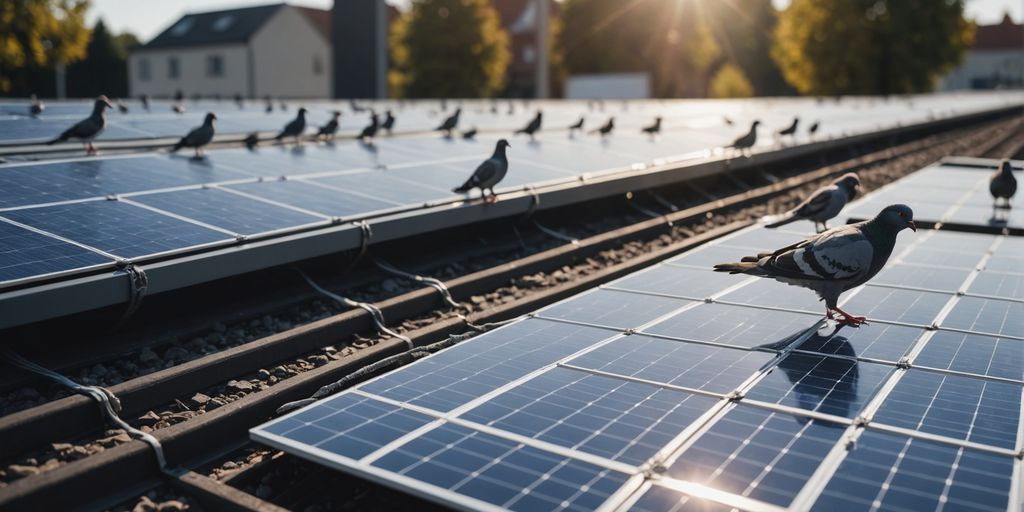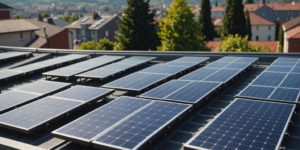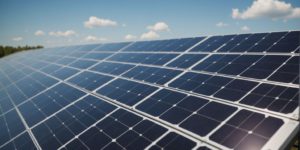Solar panels are a great investment for both the environment and your energy bills, but they can attract unwanted guests—pigeons. These birds find solar panels to be an ideal nesting spot, which can lead to various issues, including damage to the panels, health risks from droppings, and reduced efficiency. In this article, we’ll explore various methods to keep pigeons away from your solar panels, ensuring they remain in optimal condition.
Key Takeaways
- Installing physical barriers like bird mesh and spikes can effectively deter pigeons from nesting under your solar panels.
- Regular maintenance and cleaning are crucial to prevent the accumulation of bird droppings, which can cause health risks and damage to the panels.
- Visual and auditory deterrents, such as fake birds of prey and sound devices, can be used to scare pigeons away.
- Legal and ethical considerations should be taken into account when implementing pigeon control measures to ensure humane treatment of wildlife.
- Advanced technological solutions like ultrasonic repellents and automated sprinkler systems offer innovative ways to keep pigeons at bay.
Understanding the Problem of Pigeons and Solar Panels
Why Pigeons Are Attracted to Solar Panels
Pigeons and other birds are naturally drawn to solar panels for several reasons. Solar panels provide an ideal shelter from predators and harsh weather conditions. The space beneath the panels offers a safe and secure nesting spot, making it an attractive location for birds. Additionally, the warmth generated by the panels can be appealing, especially during colder months.
Common Issues Caused by Pigeons
The presence of pigeons under solar panels can lead to a multitude of problems. Nesting materials and droppings can accumulate, reducing the efficiency of your solar investment. Pigeon droppings are highly acidic and can cause corrosion and structural damage to the panels. This build-up can also block sunlight, further decreasing the panels’ effectiveness. Moreover, the constant noise and mess created by these birds can be a significant nuisance for homeowners.
Health Risks Associated with Pigeon Droppings
Pigeon droppings are not just a cosmetic issue; they pose serious health risks. The droppings can carry over 60 different diseases, some of which can be fatal to humans. Regular exposure to these droppings can lead to respiratory issues and other health complications. Therefore, it is crucial to address the problem promptly to protect both your health and your solar panel investment.
Physical Barriers to Deter Pigeons
Pigeons can be a persistent problem for solar panel owners, but physical barriers offer an effective solution to keep these birds at bay. By implementing various physical deterrents, you can protect your solar panels from damage and maintain their efficiency.
Visual and Auditory Deterrents

To keep pigeons away from your solar panels, visual and auditory deterrents can be highly effective. These methods are not only humane but also relatively easy to implement. Combining multiple deterrents often yields the best results. Here are some popular options to consider:
Fake Birds of Prey
Using fake birds of prey is a common method to scare pigeons away. These plastic predators are easy to install and don’t require any maintenance. However, they are most effective when pigeons haven’t already established a nesting area. For added effectiveness, consider combining this method with other deterrents like nets or spikes.
Reflective Objects
Reflective objects can disorient and scare pigeons. Items like reflective tape, old CDs, or specialized reflective bird deterrent kits can be hung around the solar panels. The light reflections create an uncomfortable environment for pigeons, encouraging them to move elsewhere.
Sound Devices
Sound devices, such as a Bird Deterrent Speaker, emit noises that are unpleasant for pigeons. These devices can be programmed to play predator calls or other disturbing sounds at intervals. While effective, it’s important to ensure the sound levels are not disruptive to humans or pets in the vicinity.
Implementing a combination of visual and auditory deterrents can create a hostile environment for pigeons, making your solar panels less attractive to them.
Regular Maintenance and Cleaning
Maintaining your solar panels is crucial to ensure their longevity and efficiency. Regular maintenance can significantly reduce the likelihood of issues caused by pigeons and other birds. Here are some essential steps to keep your solar panels in top condition.
Legal and Ethical Considerations
Wildlife Protection Laws
When implementing measures to keep pigeons away from solar panels, it’s crucial to be aware of wildlife protection laws. These laws often prohibit the harming or killing of birds, as well as the destruction of their nests. Violating these regulations can result in hefty fines and legal consequences. Always ensure that any deterrent methods used are compliant with local wildlife protection statutes.
Humane Deterrent Methods
Using humane methods to deter pigeons is not only ethical but also often more effective in the long run. Humane deterrents include options like bird mesh, spikes, and netting, which prevent pigeons from accessing the area without causing them harm. These methods are designed to create a physical barrier, making the environment less attractive to pigeons.
Ethical Pest Control
Ethical pest control involves considering the well-being of the animals while protecting your solar panels. This means avoiding lethal methods and instead opting for deterrents that encourage pigeons to relocate. Ethical pest control practices ensure that you are not only protecting your investment but also adhering to moral standards.
By using humane and ethical methods, you can protect your solar panels from pigeons while also respecting wildlife and complying with legal requirements.
Advanced Technological Solutions
Ultrasonic Repellents
Ultrasonic repellents are a modern solution to deter pigeons from your solar panels. These devices emit high-frequency sounds that are inaudible to humans but highly irritating to birds. Ultrasonic repellents are effective because they create an uncomfortable environment for pigeons, encouraging them to find a new place to roost.
Automated Sprinkler Systems
Automated sprinkler systems can be programmed to activate at specific times or when motion is detected. This sudden burst of water startles pigeons and discourages them from settling on your solar panels. The use of automated sprinklers is a humane and eco-friendly method to protect your investment.
Solar Panel Monitoring Systems
Solar panel monitoring systems not only track the performance of your solar panels but can also alert you to any issues caused by pigeons. These systems provide real-time data, allowing you to take immediate action if pigeons are affecting your solar panel protection. Investing in a monitoring system is an essential step to ensure the longevity and efficiency of your solar panels.
Protecting Solar Panel Wiring
Ensuring the safety and longevity of your solar panel system involves more than just keeping the panels themselves in good condition. Protecting the wiring is equally crucial to prevent damage and maintain efficiency. Here are some effective strategies to safeguard your solar panel wiring from potential threats, including wildlife and environmental factors.
DIY vs Professional Services
Pros and Cons of DIY Methods
Taking the DIY route for pigeon-proofing your solar panels can be tempting due to the potential cost savings. However, it’s essential to weigh the pros and cons before making a decision.
Pros:
- Cost-effective: DIY methods can save you money on labor costs.
- Flexibility: You can work on your schedule and at your own pace.
- Learning Experience: It can be a rewarding experience to learn new skills.
Cons:
- Safety Risks: Working on roofs can be dangerous without proper safety equipment.
- Effectiveness: DIY solutions may not be as effective as professional installations.
- Time-consuming: It can take a significant amount of time to research, purchase materials, and complete the installation.
When to Call Professionals
While DIY methods have their advantages, there are situations where hiring professionals is the better option. If you notice persistent pigeon problems despite your efforts, it might be time to call in the experts. Professionals have the experience and tools to handle complex issues effectively.
- Complex Installations: If your solar panel setup is intricate, professional help ensures proper installation.
- Health Risks: Pigeon droppings can carry diseases, and professionals are trained to handle such hazards safely.
- Weather Resistance: Professionals can install solutions designed to withstand various weather conditions.
Cost Comparison
Understanding the cost implications of DIY vs. professional services can help you make an informed decision. Below is a comparison table to illustrate the potential costs involved.
| Service Type | Estimated Cost |
|---|---|
| DIY Materials | $100 – $300 |
| Professional Installation | $500 – $1,500 |
| Bird Spike Installation Cost | $200 – $500 |
Note: While DIY methods may seem cheaper initially, the long-term effectiveness and safety provided by professional services can offer better value.
In conclusion, both DIY and professional services have their merits. Assess your specific situation carefully to determine the best approach for keeping pigeons away from your solar panels.
Long-Term Strategies for Pigeon Control
Creating an Unattractive Environment
To keep pigeons away from your solar panels, it’s essential to make the environment less appealing to them. Remove any food sources and nesting materials that might attract pigeons. Ensure that your yard and garden are clean and free from debris. This can significantly reduce the likelihood of pigeons settling in the area.
Implementing Multiple Deterrents
Using a combination of deterrents can be more effective than relying on a single method. For instance, you can pair bird netting with bird spikes to create a comprehensive barrier. Additionally, consider using visual and auditory deterrents like fake birds of prey and sound devices. This multi-faceted approach can help ensure that pigeons stay away from your solar panels.
Monitoring and Adapting Strategies
Regularly monitor the effectiveness of your pigeon control methods. If you notice that pigeons are still a problem, it may be time to adapt your strategies. For example, if bird spikes alone are not working, you might need to add bird mesh or netting. Pigeon Removal Service providers can offer valuable insights and assistance in adapting your strategies to keep your solar panels pigeon-free.
Consistent monitoring and adaptation of your pigeon control methods can lead to long-term success in protecting your solar panels.
| Deterrent Method | Effectiveness | Cost |
|---|---|---|
| Bird Spikes | Moderate | Low |
| Bird Netting | High | Moderate |
| Fake Birds of Prey | Moderate | Low |
| Sound Devices | High | High |
| Pigeon Removal Service | Very High | Variable |
By implementing these long-term strategies, you can protect your solar panels from pigeons and ensure their optimal performance. Companies like Goldshot Exterminating can provide professional services to help you maintain a pigeon-free environment around your solar panels.
Case Studies and Success Stories
In a suburban neighborhood in California, a homeowner faced significant issues with pigeons nesting under their solar panels. The droppings and debris were causing a noticeable decline in the efficiency of the panels. After consulting with a local pest control service, they decided to install bird mesh around the panels. This simple solution effectively prevented pigeons from accessing the area, leading to a significant improvement in the solar panel’s performance.
A commercial building in downtown Los Angeles was experiencing similar problems with pigeons. The building management opted for a combination of bird spikes and netting. This dual approach not only kept the pigeons away but also ensured that the solar panels remained clean and efficient. The management reported a 20% increase in energy output post-installation.
- Prevention is Key: Installing physical barriers like bird mesh and spikes can prevent pigeons from nesting in the first place.
- Regular Maintenance: Scheduling regular inspections and cleanings can help maintain the efficiency of solar panels.
- Professional Help: Sometimes, it’s best to consult with professionals who can provide tailored solutions for specific issues.
By implementing these strategies, both residential and commercial properties can protect their solar investments and ensure optimal performance.
| Case Study | Solution | Outcome |
|---|---|---|
| Residential | Bird Mesh | Improved Efficiency |
| Commercial | Spikes & Netting | 20% Increase in Output |
Discover how our clients have transformed their energy consumption and saved money with our solar solutions. From residential to commercial installations, our case studies and success stories highlight the real-world benefits of going solar. Ready to start your own success story? Visit our website to learn more and get started today!
Conclusion
Protecting your solar panels from pigeons is essential to maintain their efficiency and longevity. By implementing measures such as installing mesh, spikes, or fake birds of prey, you can effectively deter pigeons from nesting and causing damage. Regular cleaning and maintenance are also crucial to ensure that your solar panels operate at their optimal performance. Remember, investing in preventive measures not only safeguards your solar panels but also enhances their lifespan and efficiency, ultimately saving you money and ensuring a sustainable energy source for years to come.
Frequently Asked Questions
Why are pigeons attracted to solar panels?
Pigeons are attracted to solar panels because they provide shelter from the elements and predators. The space underneath the panels offers a safe and warm nesting spot.
What are the common issues caused by pigeons on solar panels?
Common issues include reduced efficiency due to droppings and nesting materials blocking sunlight, physical damage to the panels and wiring, and potential health risks from pigeon droppings.
How can bird mesh help in keeping pigeons away from solar panels?
Bird mesh acts as a physical barrier that prevents pigeons from accessing the area underneath the solar panels, thereby preventing them from nesting and causing damage.
Are bird spikes effective in deterring pigeons from solar panels?
Yes, bird spikes can be effective. They create an uncomfortable surface for pigeons to land on, deterring them from perching or nesting on the solar panels.
What are the health risks associated with pigeon droppings on solar panels?
Pigeon droppings can carry over 60 diseases, some of which can be serious or even fatal to humans. The droppings can also cause corrosion and structural damage to the solar panels.
Is it necessary to clean bird droppings off solar panels regularly?
Yes, regular cleaning is necessary to maintain the efficiency of the solar panels and to prevent health risks and structural damage caused by the accumulation of bird droppings.
What are some humane methods to deter pigeons from solar panels?
Humane methods include installing bird mesh, using bird spikes, setting up netting, and employing visual and auditory deterrents like fake birds of prey and sound devices.
When should I consider hiring professional services for pigeon control on solar panels?
You should consider hiring professional services if DIY methods are not effective, if there is significant damage or health risk, or if you prefer a comprehensive and long-term solution.


